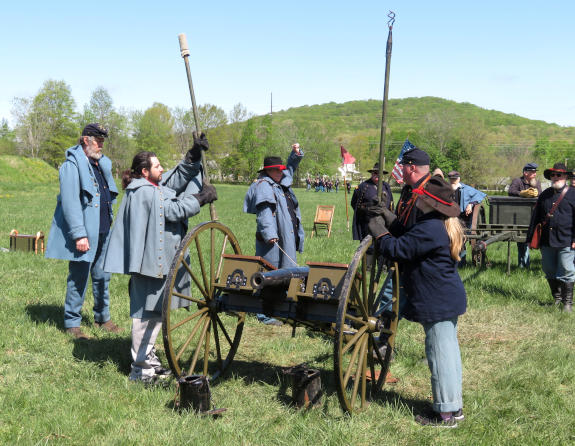NEWS OF 150 YEARS AGO
November/December 1861
From The Missouri Democrat, Saturday, November 2, 1861.
How Tents May Be Dried.
A member of the Rhode Island Second writes from Camp Brightwood:
The cold has pinched us “quite smartly,” so that we not only feel the need of warmer blankets and more of them, but of good fires also. The need of protection against sudden cold has set the inventive wits of our Yankee soldiers to work. A plan was soon hit upon. This is the description: A hole is dug in the center of the tent two feet in depth and diameter. This is walled with stones laid in soft clay, and covered at the top with the exception of a small aperture for the introduction of fuel. For this aperture there must be a close fitting door or cover, which can be opened and closed at pleasure. Across one side of the tent a trench is laid and covered with wood and earth through which the cold air is conveyed freely to the bottom part of this subterranean fire place. From the top of the same, and across the opposite side of the tent, another trench is laid and carefully covered with stone and earth, through which all of the smoke and surplus heat is carried off. This is the whole machine. The merits of it are obvious. It is universally practicable. It can be introduced easily into any tent or dwelling. The economy of it—it costs only a few hours’ work for three or four men. The convenience of it—being entirely under ground it takes up none of the precious room of our small tents. The utility of it—it dries and warms the earth within, and event beyond the entire circuit of the tent, and thus prevents those damp, cold and unhealthy exhalations from the earth which are probably the chief cause of the ill health among soldiers. The tents are thus also furnished with a moist and genial atmosphere, the heat of which can be easily increased so as to meet the exigencies of the coldest part of the season. To realize the importance of this you must remember that the walls of our houses are only thin canvas—that they are so readily penetrated by cold, or heat, or moisture, that the atmosphere within follows rapidly the changes in the condition of the atmosphere without. Indeed, so far as this is concerned, there is but very little difference between living under the tents and in the open air.



